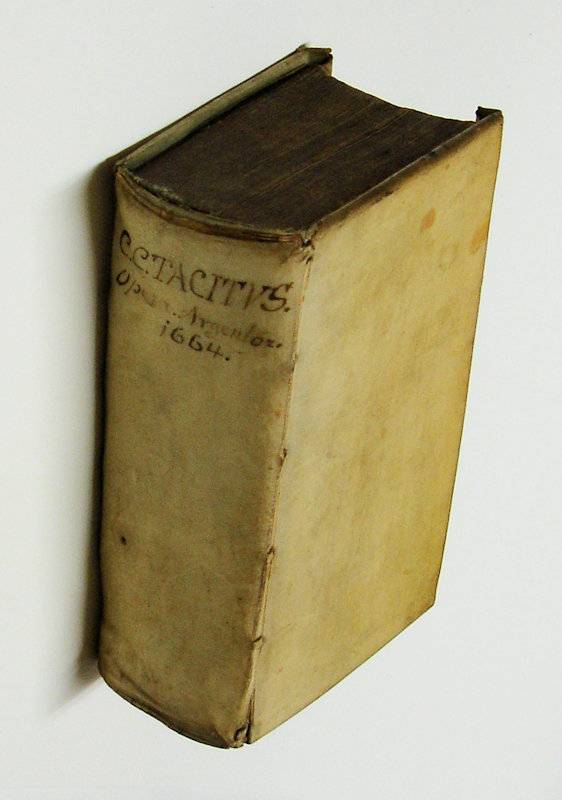TACITUS.
C. Cornelius Tacitus, accurante Matthia Berneggero.
Strassburg (Argentorati), Ediderunt Georgius Andreas Dolhopfius & Johannes Eberhardus Zetznerus, 1664.
8vo. (XVIII,1122,(2 blank)) p. Overlapping vellum 17 cm (
Ref: VD17 547:695101K; Schweiger 2,1002; Dibdin 2,452; Moss 2,643; Graesse 6/2 9; Fabricius/Ernesti 2,398) (
Details: 6 thongs laced through the joints. Engraved title, depicting an altar, left of which stands a Roman emperor, right a German warrior; on the surface of the altar the text 'Aeternitati', for Eternity; just above the altar hangs the globe, upon which stands an eagle with spread wings. This scene seems a combination of two Roman coins. It was perhaps made after the verso side of a coin struck by Constantine the Great in Trier in 321 A.D.; on this coin there is however no eagle; a scene consisting of a globe on which an eagle stands, is to be seen on a denarius of Caracalla, struck after 217 A.D. This frontispiece is purely propagandistic in its presentation. It depicts not so much the struggle between the Romans and the German tribes, that Tacitus tells about. It rather symbolizes the claim of the Holy Roman Empire (Sacrum Romanum Imperium, Heiliges Römisches Reich), that it was the legitimate successor 'for eternity' of the Roman Empire. The imperial banner of the Holy Roman Empire depicted a black eagle) (
Condition: Vellum age-tanned and slightly worn & spotted. Head of the spine chafed. Front & rear joint starting to split for 1 cm. Some old ink underlinings. Paper browning. Bookplate on the front pastdown) (
Note: The Roman historian Publius Cornelius Tacitus offered ammunition for many intellectual and political battles in 16th and 17th century Europe. The turmoil caused by the emerging new monarchies in England, France en Spain, civil and religious wars in Italy and Germany, and the plague, made Tacitus' account of the state of the early Roman Empire increasingly topical and relevant. The debate Tacitus provoked in intellectual circles was of course on Roman history, but also on literary style, in Latin and the vernacular, but more so on historical and political thought. Tacitus ideas were not original, but he brought them in a forceful lapidary way, oneliners ready for the use in debate. Tacitus became in a corrupted world 'the one true guide for those involved in the awful revolution of modern times: he "teaches well the mode of life under tyrants, just as he teaches tyrants how to establish tyranny'' '. (The Classical Tradition, Cambr. Mass., 2010, p. 921) The French humanist scholar Muretus (Marc Antoine Muret, 1526-1585) declared that 'Tacitus' descriptions of lost liberty, failed revolutions, vicious civil wars, and mad emperors amounted to a theater of our time'. (Op. cit., ibid.)
§ The editor of this Tacitus edition, the German classical scholar Matthias Bernegger, 1582-1640, was the founder of the School of Roman history at Strassburg, where a protestant university was founded in 1621. The model of this school was the Flemish editor of Tacitus, Justus Lipsius, 1547-1606, who was one of the most learned men of his day. His great Tacitus editions placed and still places Lipsius in the front rank of classical scholarship. Our Tacitus edition of 1664 is an exact reissue of Bernegger's Tacitus, that was first published in in Strassburg in 1638. It includes 'many excellent notes and emendations due to his pupil and son-in-law Johannes Casper Freinsheim (1608-1660), the foremost representative of this school'. (Sandys,J.E., 'A History of Classical Scholarship', N.Y., 1964, p. 367) The edition offers also a 144 page treatise 'Ioannis Freinshemii expositio locorum cornelianorum intactorum interpretibus, aut secus acceptorum' and an elaborate and exemplary 272 page 'Index in Tacitum confectus industria et labore Melchiore Freinshemii'.
§ Lipsius praised Tacitus as a teacher of vital political lessons. In his
Politica (
Politicorum sive Civilis doctrinae libri sex, 1589) 'a brilliant textbook in mosaic form, composed of passages from the ancients, far more of them taken from Tacitus than from any other source - Lipsius showed how to make a version of Tacitus' analysis of empire fit the practical needs of the modern governing classes'. (The Classical Tradition, Cambr. Mass., 2010, p. 921) Bernegger, professor of History, from 1613 till his death in 1640, produced a revised and augmented edition of Lipsius' Politica, which was published posthumously in Strassburg in 1642. It saw several reissues in that city and in Frankfurt. Bernegger was from his appointment in Strassburg in 1613 the starting point of the so-called Lipsian tradition, an historic-political school of thought in late humanist philology, which exercised well into the 18th century influence on the German protestant universities of Jena, Altorf, Marburg and Strassburg ('Justus Lipsius, Politica: Six Books of Politics Or Political Instruction', Edited with translation and introduction by J. Waszink, Assen 2004, p. 194/95) Bernegger lectured on Lipsius' Politica, and like Lipsius he considered Tacitus' view on politics the best guiding principle leading to 'prudentia' in the turmoil of his time.) (
Provenance: Bookplate: 'Bibliothek Oberherrlingen, E.M. 1839'. Eugen von Maucler, 1783-1859, was a German politician and bibliophile. His library was located at 'Schloss Oberherrlingen' near Ulm; see for Eugen von Maucler, his library, a portrait, and a picture of the bookplate: Wikipaedia)(
Collation: a8 (minus leaf a8), b2; A-4A8, 4B2 (leaf 4B2 blank)) (Photographs on request)
Book number: 120198 Euro 210.00
Keywords: (Oude Druk), (Rare Books), Germania, Latin literature, Roman history, Tacitus, antike altertum antiquity, römische Geschichte, römische Literatur
 TACITUS.
TACITUS.